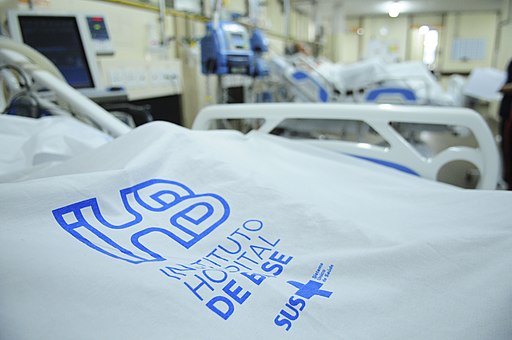What is the healthcare system like in Brazil? Posted by carol on Apr 13, 2020 in Brazilian News, Brazilian Profile, Culture, Vocabulary
Bom dia a todos! Good morning, everyone! In recent months, news reports from around the world seem to be focused primarily on on the coronavirus pandemic updates. And one of the medidas (measures) taking effect in several countries is the quarantine and social isolation so that the so-called contagion curve decreases. All of these drastic actions that have greatly altered the way we live and behave are carried out in order not to overburden os sistemas de saúde (health systems). Different countries have different health systems, with their own specificities and políticas (policies), which vary according to the reality of each nation. And Brazil is no exception, where SUS, an acronym for Sistema Único de Saúde (Unified Health System), is the highest national institution in this regard. How about we get to know a little more about the Brazilian healthcare system?
Inspired by the British model of the National Health Service (NHS), where most of the financing of its actions is through verba pública (public funds), that is, impostos (taxes) paid by the population, SUS was born in 1988 from an ambitious project of universal, gratuito (free) and unrestricted access to health throughout the national territory. It is important to note that in its trinta e dois (32) years of existence, SUS was responsible for the maior (largest) worldwide vaccination program and that Brazil is the only country with over 100 million inhabitants that ensures assistência médica de graça para todos (free medical care for all), as a constitutional right of its cidadãos (citizens).
However, it is undeniable that the Brazilian Unified Health System is no “mar de rosas” (bed of roses). It suffers from many problems as well, and the most common reclamações (complaints) are the precariousness of many of its postos de atendimento (service stations), lack of public investment, filas longas (long lines) and tempo de espera (waiting time). Either way, in a country with one of the highest levels of social inequality in the world, a health system that equally benefits everyone is very important, where everything can be done sem custos (free of charge), from simple blood pressure monitoring and distribution of remédios (medicines) for doenças crônicas (chronic diseases), to more complex procedures like cancer or HIV treatment, hemodialysis or even organ transplants.
And now you are probably wondering: as a tourist, student, migrant or even on a short business viagem (trip) to Brazil, can estrangeiros (foreigners) be aided by the SUS program. Well, the answer is yes! The Brazilian governo (government) understands health as um direito (a right) of everyone finds themselves within national borders, with or without a residency visto (visa). So if you are in Brazil and in need of cuidados médicos (health assistance), don’t forget about SUS.
So how does the health system work in your country? Is it public and universal as it is here or is it based on the sistema privado (private system)? Be sure to tell us that below, in the comment box. Até a próxima e fiquem saudáveis! See you next time and stay healthy!

Build vocabulary, practice pronunciation, and more with Transparent Language Online. Available anytime, anywhere, on any device.





Comments:
Thomas Murray:
No “meu” país de Portugal, também é gratuito nos hospitais, com pagamento simbólico apenas nas clínicas. Não me perguntem sobre o estado do sistema de saúde no meu país de origem, os EUA, que eu descrevo como simplemente criminoso.
carol:
@Thomas Murray Que interessante, Thomas! Não sabia que Portugal era gratuito.
Obrigada por ler nosso blog 🙂
Abraços,
Carol
Kees Marges:
1. If this great system of health care excists, why do people need the extreme expensive private insurances?
2. Why don’t they have this extremely impotant system of family docters as they have in the UK, where I used to live for 11 years. Living in Brazil now and originally coming from the Netherlands where they still have an excellent system of family docters, ‘huisartsen’ as the entrance to special care and hospitals, I miss them here in Brazil. They are the basis for the health care sysem in the Netheerlands.
carol:
@Kees Marges Hey there!
You have a point there. It is true that a large number of people resort to private and often expensive health care, but the text does emphasize the fact that the vast majority of the population cannot afford those, and even though the SUS has a great deal of problems that must be addressed, it is still remarkable in many aspects.
I have vaguely heard about family doctors, it does seem very interesting and something that should me implemented in more countries. Thank you for sharing!